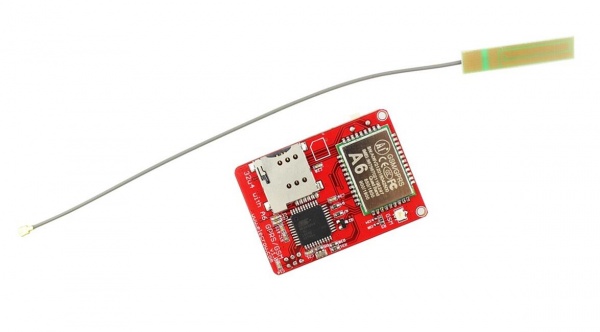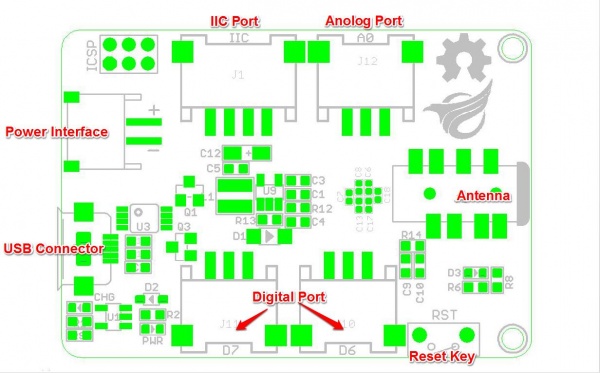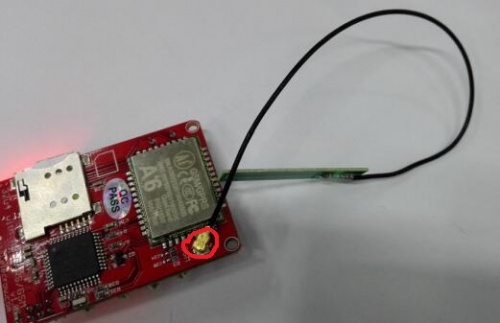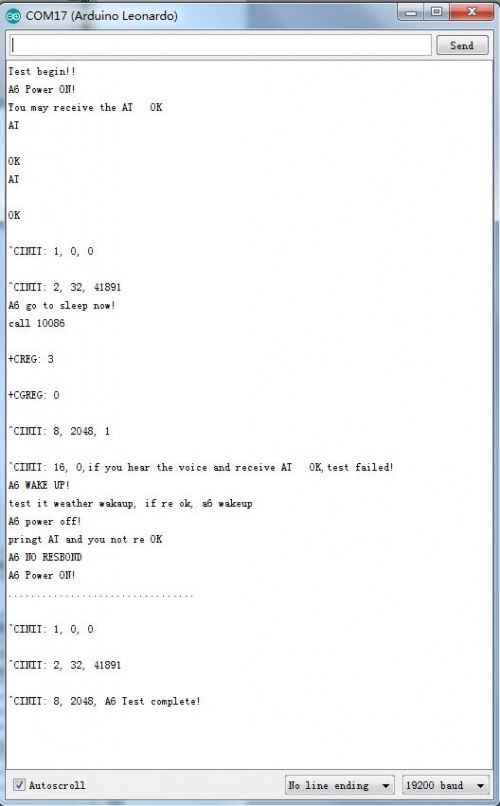32u4 with A6 GPRS/GSM
Introduction¶
The 32U4 with A6 GSM/GPRS Board is based on mega32U4 and A6 GSM/GPRS module. It can be used to call and seed text messages, via GPRS to upload data to server. At the same time it leads to an analog interface, an IIC interface and 2 digital interface. which you can connect to other module more easily.
Features¶
- 32U4+A6
- Work voltage: 5V
- Operating temperature -30 ℃ to + 80 ℃;
- Three kinds of interface
- 3.7V Battery power supply
- Low standby current
- Standby average current 3ma less;
- Support the GSM / GPRS Quad-band, including 850,900,1800,1900MHZ;
- Support China Mobile and China Unicom's 2G GSM network worldwide;
- GPRS Class 10;
- Sensitivity <-105;
- Support voice calls;
- Support SMS text messaging;
- Support GPRS data traffic, the maximum data rate, download 85.6Kbps, upload 42.8Kbps;
- Supports standard GSM07.07,07.05 AT commands and extended commands Ai-Thinker;
- Supports two serial ports, a serial port to download an AT command port;
- AT command supports the standard AT and TCP / IP command interface;
- Support digital audio and analog audio support for HR, FR, EFR, AMR speech coding;
- Support ROHS, FCC, CE, CTA certification;
Specifications¶
- Quad-band: 850/900/1800/1900 MHz
- GPRS multi-slot: 12, 1 to 12 may be configured
- GPRS mobile station: Class B
- Compatible with GSM Phase 2/2 +: Class 4 (2W @ 850/900 MHz) Class 1 (1W @ 1800 / 1900MHz)
- Current consumption: 1.3mA @ DRX = 5; 1.2mA @ DRX = 9
- AT command control: Standard GSM07.07,07.05 AT commands and extended commands Ai-Thinker
- SIM Application Toolkit
- GPRS Class 10: Up 85.6 kbps (upstream) & 42.8Kbps (downlink)
- PBCCH support
- Coding scheme: CS 1, 2, 3, 4
- Support CSD: Up 14.4 kbps
- Support USSD
- Stack: PPP / TCP / UDP / HTTP / FTP / SMTP / MUX
Cautions¶
- Make sure your SIM card is unlocked.
- The product is provided as is without an insulating enclosure. Please observe ESD precautions specially in dry (low humidity) weather.
- It just supports baud rate 115200bps.
Interface Function¶
Usage¶
Connect the Antenna¶
1.A miniature coaxial RF connector is present on the 32u4 with A6 GPRS/GSM to connect with a GSM Antenna. The connector present on the 32u4 with A6 GPRS/GSM is called a U.FL connecto.The GSM Antenna supplied with the GPRS Shield has an SMA connector (and not an RP-SMA connector) on it.The connection topology is shown in the diagram below:
Insert an Micro SIM card to SIM Card Holder¶
2.Pin Holder for SIM Cards. Both 1.8 volts and 3.0 volts SIM Cards are supported by A6 GPRS/GSM Module, the SIM card voltage type is automatically detected. 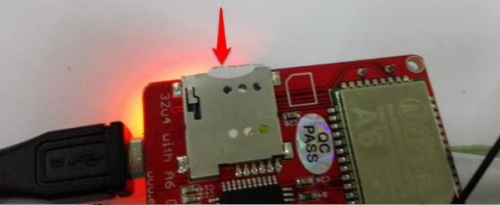
Download Code¶
Connect the USB cable to the 32u4 with A6 GPRS/GSM board,then download the code as below:
#include<stdio.h>
#include<string.h>
#define DEBUG true
void setup()
{
Serial.begin(115200);
Serial1.begin(115200);
pinMode(4, OUTPUT);
pinMode(5, OUTPUT);
pinMode(8,OUTPUT);
digitalWrite(5, HIGH);
digitalWrite(4, LOW);
digitalWrite(8, LOW);
Serial.println("After 5s, test begin!!");
delay(5000);
}
void loop()
{
Serial.println("Test begin!!");
digitalWrite(8, HIGH);
delay(3000);
digitalWrite(8, LOW);
Serial.println("A6 Power ON!");
Serial.println("You may receive the AT OK");
sendData( "AT",1000,DEBUG);
sendData( "AT",1000,DEBUG);
Serial.println("A6 go to sleep now!");
digitalWrite(5, LOW); //sleep
delay(2000);
Serial.println("call 10086");
call(); //no call, A6 sleeping
sendData( "AT",1000,DEBUG);
Serial.println("if you hear the voice and receive AT OK,test failed!");
digitalWrite(5, HIGH); // wake up
delay(1000);
Serial.println("A6 WAKE UP!");
Serial.println("test it weather wakaup, if re ok, a6 wakeup");
sendData( "AT",1000,DEBUG);
Serial.println("A6 power off!");
digitalWrite(4, HIGH); // power off A6
delay(2000);
digitalWrite(4, LOW);
Serial.println("pringt AT and you not re OK");
sendData( "AT",1000,DEBUG); //NO RE OK
Serial.println("A6 NO RESBOND");
digitalWrite(8, HIGH); //POWER UP
delay(3000);
digitalWrite(8, LOW);
delay(5000);
Serial.println("A6 Power ON!");
delay(5000);
Serial.println(".................................");
sendData( "AT",1000,DEBUG); //TEST AND MAKE CALL
delay(3000);
call();
Serial.println("A6 Test complete!");
while(1);
}
void call(void)
{
sendData( "AT+CSQ",1000,DEBUG);
sendData("AT+SNFS=0",1000,DEBUG);
sendData("ATD10086;",1000,DEBUG);
delay(10000);
sendData( "ATH",1000,DEBUG);
}
String sendData(String command, const int timeout, boolean debug)
{
String response = "";
Serial1.println(command);
long int time = millis();
while( (time+timeout) > millis())
{
while(Serial1.available())
{
char c = Serial1.read();
response+=c;
}
}
if(debug)
{
Serial.print(response);
}
return response;
}
After you complete download the code, open the serial debug window(notice set the baud rate 115200), you will see some information as bellow:
